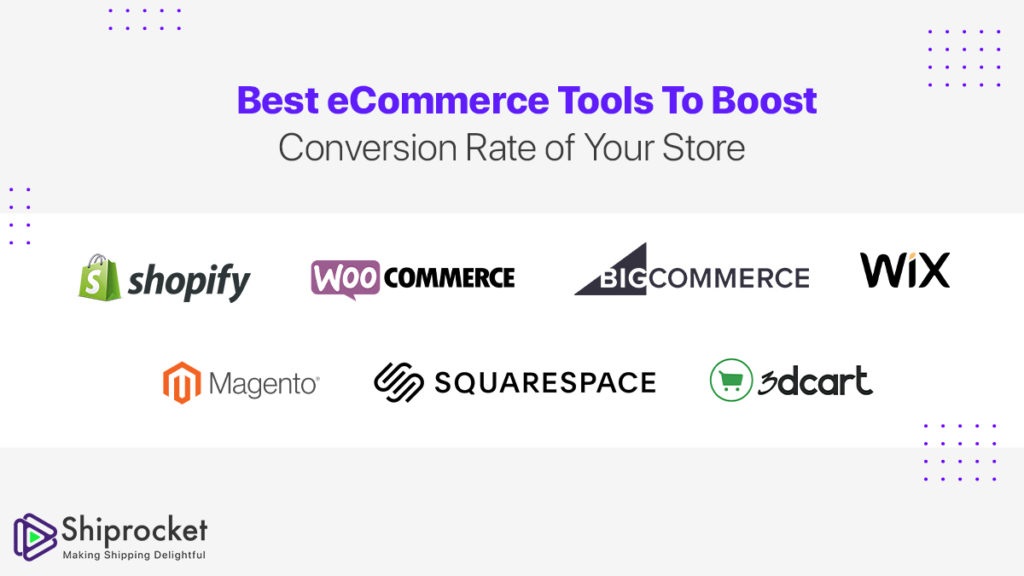Top 11 eCommerce Tools to Increase Your Store’s Conversions
Global eCommerce sales hit $5.8 trillion in 2023 and are projected to exceed $8 trillion by 2027. If you are thinking of starting a new online store or looking to expand your business, you can use eCommerce tools to achieve your goal
Not all eCommerce tools are created equally. For example, some tools offer the facility of website building, while others offer plug-ins, add-ons, and shopping cart software. So what are the best eCommerce tools to use to improve the conversion rate of your store? The answer depends on your offerings and unique situation. We are giving you a guide to help you find the best eCommerce tools for your business.
There are top 11 eCommerce tools that we’d recommend. We’ll give you an in-depth overview of the features and benefits of each one of these tools as we continue through this guide.

11 Best eCommerce Tools to Use in 2025
1. Shopify
Shopify offers unique features to help you build an eCommerce website from scratch. It has features like website builder, plugins, and shopping cart software. It is also easy for anyone to set up a website using Shopify without any technical skills.
Shopify makes it easy for you to sell from anywhere as it supports third-party marketplaces, social media platforms for selling, point-of-sale software, and in-house sales. Additionally, Shopify themes are built for use on mobile devices, and with tools like BuildFire, you can always create a mobile app for your eCommerce store. The most significant feature of Shopify is its versatility which can fit the needs of any organisation. In 2025, Shopify introduced AI-driven product recommendations and enhanced SEO tools to boost visibility and conversion rates.
2. WooCommerce
WooCommerce is a unique eCommerce tool that seamlessly integrates with WordPress. It offers all-in-one functionality to your website by installing the WooCommerce plugin.
With WooCommerce plugins, you can enable features like selling products and adding subscriptions and memberships to online stores. It offers everything you need for your eCommerce website. The tool is easily customisable and integrates with popular payment platforms like PayPal, Amazon Pay, and more. WooCommerce extensions also support integration with email marketing platforms, printing shipping labels, etc. WooCommerce is the best eCommerce tool for starting your online store without completing technical procedure and rebuilding it. You simply need to install the WooCommerce plugin and start your settings from there. WooCommerce has also improved its analytics dashboard, allowing real-time sales, inventory, and customer behaviour tracking in 2025.
3. BigCommerce
BigCommerce is used by most eCommerce businesses all over the world. It is another one of the best eCommerce tools to build for your online store that offers everything you need to start selling online. BigCommerce has a set of pre-loaded features for online conversion, sales, inventory management, website building, and web optimisation. You’ll also get their customer support for assistance on any technical and non-technical questions.
Additionally, BigCommerce offers enterprise-grade eCommerce solutions for B2B websites and B2C sites. From 2025, BigCommerce will support native multi-storefront management, making running multiple brands from a single platform easier. BigCommerce is the choice of industry leaders in eCommerce and is known for its capabilities such as high page loading speed, security features, and customisable themes.
4. Wix
Wix is one of the simplest website builders to use for eCommerce brands. The platform offers the easiest way to build a new website without any technical knowledge or experience. You can design a high-quality website with rich text, images, and videos by using its drag-and-drop builder that too in a few minutes.
Wix has 500+ templates that will automatically be optimised for SEO and mobile web browsers. A site built with Wix gives you access to the Wix App Market, filled with web apps to customise your site. You can also create an online store with your Wix website.
Wix also offers a storefront and shopping cart that allows you to add features like shopping wish lists, product galleries, add-to-cart buttons, mini-carts, and more. Wix also allows you to add custom shipping rules to manage your international orders, add your carrier preferences, and customers real-time delivery estimates. Wix offers AI-generated design suggestions and advanced marketing integrations to increase engagement and conversions.
5. WordPress
WordPress continues to be a go-to platform for those seeking complete control over their online store’s design and functionality. By leveraging WooCommerce and its vast ecosystem of plugins, WordPress allows merchants to fine-tune every aspect of their site—from SEO to customer experience. For store owners focused on streamlining the checkout process, choosing the right wordpress payment plugins can significantly enhance user trust and boost conversions.
6. Adobe Commerce (formerly Magento)
Adobe Commerce (Magento) is not only an eCommerce tool but also an all-in-one eCommerce solution that can help you create an eCommerce store quickly. The platform provides the best features for small business websites and B2B online stores.
It is known for its performance, automation, and accessibility to business intelligence tools and shipping solutions. This eCommerce tool offers unique features such as tools for customer segmentation and personalisation, which automatically display products, add promotions, content, and prices based on different factors.
7. Squarespace
Squarespace is a well-known eCommerce tool with integrated capabilities for building creative online stores. The Squarespace theme designs are beautiful and are perfect for fashion sites, beauty products, travel bloggers, and photographers. If you want to showcase your work, Squarespace offers the best website themes to do it.
You can also use the Squarespace eCommerce tool to add subscriptions and digital content to your website.
The tool provides automatic inventory management, a shipping rate calculator, product display options, and integration with payment platforms such as PayPal and Apple Pay. Squarespace now includes enhanced SEO features and automated marketing workflows too. If you want to create a blog website with eCommerce capabilities, Squarespace is the best choice for you.
8. 3DCart (now Shift4Shop)
[Rebranded as] Shift4Shop platform offers robust tools to build your eCommerce store. You can use this tool to design your eCommerce website with advanced features and capabilities. The platform offers fully customized templates and themes; however, hiring a developer may be necessary to implement them.
The platform provides fully customised templates and themes; Once done with the installation part, you’ll have access to its 50+ themes and 100+ payment processors. Shift4Shop allows you to integrate with platforms like MailChimp, Stripe, Facebook, Amazon, PayPal, QuickBooks, and more. Shift4Shop has introduced automated tax calculation and omnichannel sales integration as new features in 2025.
9. OpenCart
OpenCart is an open-source eCommerce solution suitable for businesses looking for flexibility and economy. It is popular for its lightweight framework, user-friendly interface, and low OpenCart Development Cost, allowing vendors to set up advanced online stores with ease. In addition to multi-store management, the platform enables businesses to manage multiple stores from a unified Admin panel. Each storefront can have geographically specific products, currencies, and languages. It is easily customisable with over 13,000 themes and modules ranging from electronics to handmade products.
OpenCart is also equipped with built-in SEO tools, one-click product imports, and supports 20+ payment gateways, which makes it perfect for small to mid-sized enterprises. In 2025, OpenCart launched its AI-powered technology for analysing customer behaviour patterns and automatically monitoring inventory restocking notifications, which minimises administrative work.
10. Square Online
Square Online simplifies the transition from offline retail shops to an omnichannel framework. It is fully integrated with Square’s POS and manages the online and offline stock in real time, eliminating the possibility of overselling. Merchants can easily set up an M-Commerce store using the user-friendly drag-and-drop editor, which also offers SEO, abandoned cart retrieval, and curbside pick-up scheduling. It also offers membership schemes and discounts, enabling businesses to drive repeat purchases.
With its 2025 update, Square Online added AR-enabled virtual try-ons for clothing and home furnishings to help customers project items into their surroundings. It offers retailers easy payment processing and unifies offline and online sales, setting a low operational burden for those hoping to broaden their digital presence.
11. Ecwid
Ecwid is an all-in-one eCommerce tool; it allows customers to add a shopping cart feature on any website, social media profile, or blog without extensive programming knowledge. By having an “embed once, sell everywhere” policy, it allows WordPress, Instagram, or Etsy users to manage their inventory, orders, and customers from one dashboard. It guarantees mobile readiness, automates tax calculations, and supports more than fifty payment gateways.
This platform also provides a free basic plan account, which is great for small and budding eCommerce businesses as they don’t have to worry about high costs in the beginning.
How to Choose the Right eCommerce Tool for Your Business
Selecting the right eCommerce tool depends on your business needs, budget, and technical capabilities. Here are a few factors to consider:
- Business Size and Model – Small businesses might benefit more from platforms like Wix or Squarespace, while larger enterprises might prefer BigCommerce or Magento for scalability.
- Customisation Needs – Tools like WooCommerce and Shift4Shop offer extensive customisation options but may require technical expertise.
- Budget Considerations – Platforms like Shopify offer a variety of pricing tiers to fit different budgets.
- SEO and Marketing Features – Ensure the platform integrates SEO tools and marketing automation to drive traffic and improve conversions.
- Integration and Support – Look for tools that support payment gateways, inventory management systems, and customer support integrations.
Considering these factors can help you make an informed decision, improving your store’s performance and long-term growth.
Shiprocket’s Role in eCommerce Success
Shiprocket supports eCommerce businesses with integrated solutions across logistics, fulfillment, and customer engagement, helping streamline operations and drive growth.
- Logistics and Shipping – Integrates with platforms like Shopify and WooCommerce, offering AI-driven courier selection, 25+ courier partners, and cross-border shipping to 220+ international destinations.
- Warehouse and Fulfillment – Enables faster delivery with multi-location warehouses, same-day/next-day shipping, and real-time inventory updates.
- Returns and Reverse Logistics – Simplifies returns with automated restocking, refunds, and efficient reverse logistics.
- Customer Engagement (SR Engage 360) – Automates personalised notifications and real-time order updates, enhancing the post-purchase experience.
- Analytics – Provides insights on shipping performance, inventory, and customer behavior to optimise operations.
Conclusion
eCommerce shopping has already moved online. In the coming years, shoppers will only spend more on online purchases. And to make this easy, eCommerce brands will have to focus on their branding efforts and the types of eCommerce tools that can be used to achieve success. Platforms like Shopify, WooCommerce, and BigCommerce help create scalable stores, while solutions like Shiprocket optimise logistics, fulfillment, and engagement. By using these tools, you can speed up deliveries, manage inventory better, handle returns smoothly, and keep customers happy.






